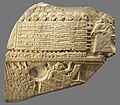Sumer
| Advanced search |
- About 7 results found and you can help!
 The Samarra bowl, at the Pergamonmuseum, Berlin. The swastika in the center of the design is a reconstruction. |
Sumer (from Akkadian '; Sumerian ', approximately "land of the civilized kings" or "native land" means "native, local", in some contexts is "noble"(ĝir NATIVE (7x: Old Babylonian) from The Pennsylvania Sumerian Dictionary). Literally, "land of the native (local, noble) lords". Stiebing (1994) has "Land of the Lords of Brightness" (William Stiebing, Ancient Near Eastern History and Culture). Postgate (1994) takes en as substituting eme "language", translating "land of the Sumerian tongue" (. Postgate believes it likely that eme, 'tongue', became en, 'lord', through consonantal assimilation.)</ref>) was an ancient civilization and historical region in southern Mesopotamia, modern Iraq during the Chalcolithic and Early Bronze Age. Although the earliest historical records in the region do not go back much further than ca. 2900 BC, modern historians have asserted that Sumer was first settled between ca. 4500 and 4000 BC by a non-Semitic people who may or may not have spoken the Sumerian language (pointing to the names of cities, rivers, basic occupations, etc. as evidence). These conjectured, prehistoric people are now called "proto-Euphrateans" or "Ubaidians", and are theorized to have evolved from the Samarra culture of northern Mesopotamia (Assyria). The Ubaidians were the first civilizing force in Sumer, draining the marshes for agriculture, developing trade, and establishing industries, including weaving, leatherwork, metalwork, masonry, and pottery. However, some, such as Piotr Michalowski and Gerd Steiner, contest the idea of a Proto-Euphratean language or one substrate language.
- Related: History of Iraq, Akkadian Empire, Third Dynasty of Ur, Elamite Empire, Sumerian king list, History of writing numbers, Epic of Gilgamesh, Sumerian Farmer's Almanac, Ziggurat, Babylon
| Ancient Sumer History --- The History of the Ancie... Ancient Sumer History --- The History of the Ancient Near East Electronic Compendium ancientneareast.tripod.com/Sumer.html - Web |
| Iraq’s Ancient Past Iraq’s Ancient Past www.penn.museum/sites/iraq/ - Web |
| Map of The Fertile Crescent Map of The Fertile Crescent www.utexas.edu/courses/classicalarch/images1/mapANEprecip.jpg - Web |
Gallery for «Sumer»
Average relevance
| Sumerian Language Page Sumerian Language Page www.sumerian.org - Web |
| ETCSL: The Electronic Text Corpus of Sumerian Lite... ETCSL: The Electronic Text Corpus of Sumerian Literature etcsl.orinst.ox.ac.uk - Web |
| PSD: The Pennsylvania Sumerian Dictionary PSD: The Pennsylvania Sumerian Dictionary psd.museum.upenn.edu - Web |
| CDLI: Cuneiform Digital Library Initiative CDLI: Cuneiform Digital Library Initiative www.cdli.ucla.edu - Web |



